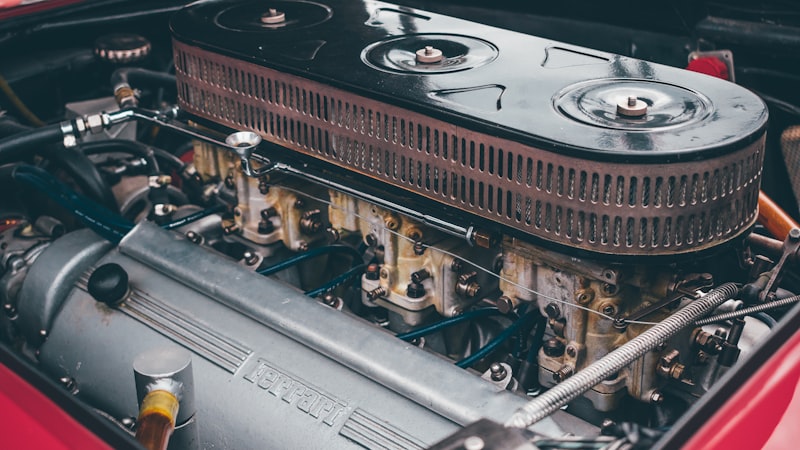Have you ever experienced transmission issues with your vehicle? It can be frustrating and costly to deal with such problems. While there can be various factors behind transmission troubles, one surprising culprit that often goes unnoticed is a weak battery. Yes, you heard it right! A weak battery can indeed cause transmission problems, and in this article, we will explore why.
Imagine your vehicle’s battery as the heart of its electrical system. It supplies power to all the essential components, including the transmission. When the battery is weak or not providing sufficient voltage, it can lead to a range of transmission issues. Here’s how it happens:
-
Insufficient Power Supply: The transmission relies on electrical signals to shift gears smoothly. A weak battery cannot deliver enough power to these signals, causing erratic shifting or failure to engage gears properly. This can result in harsh shifts, slipping gears, or even the inability to shift at all.
-
Sensor Malfunction: Modern vehicles use sensors to monitor various aspects of the transmission, such as fluid pressure and temperature. These sensors require a stable power supply from the battery to function accurately. A weak battery can disrupt their operation, leading to incorrect readings and subsequent transmission issues.
-
Solenoid Problems: Solenoids are responsible for controlling the flow of transmission fluid within the system. They rely on electrical current to operate efficiently. If the battery is weak, the solenoids may not receive enough power, causing them to malfunction. This can result in delayed or improper gear shifts.
Now, you might be wondering how to identify if a weak battery is causing your transmission problems. Well, here are some signs to look out for:
- Delayed or jerky gear shifts
- Slipping gears
- Transmission fails to engage or disengage
- Strange noises coming from the transmission
- Dashboard warning lights related to the transmission
If you experience any of these issues, it’s crucial to have both your battery and transmission checked by a qualified mechanic. They can inspect the battery’s voltage and health, as well as diagnose any underlying transmission problems.
Power Play: Unveiling the Surprising Link Between Weak Batteries and Transmission Issues
Are you tired of dealing with transmission issues in your vehicle? You might be surprised to learn that weak batteries could be a contributing factor. Yes, that’s right! There is a surprising link between weak batteries and transmission problems. In this article, we will delve into the details of this power play and explore how these seemingly unrelated components can impact each other.
Picture this: you’re driving down the road, enjoying a smooth ride, when suddenly your transmission starts acting up. Shifting becomes sluggish, gears grind, and you find yourself struggling to accelerate. Before you panic and rush to the mechanic, consider the possibility that your battery might be the culprit.
You see, modern vehicles heavily rely on electrical systems to operate smoothly. The transmission system is no exception. It requires a steady supply of electricity to function optimally. A weak battery, unable to provide enough power, can cause voltage fluctuations and disrupt the delicate balance needed for seamless transmission operation.
But how does a weak battery lead to transmission issues? Well, when the battery doesn’t deliver sufficient power, it affects the performance of the transmission control module (TCM). The TCM is responsible for managing gear shifts, engaging clutches, and coordinating various transmission functions. Insufficient power can hinder its ability to send accurate signals, leading to erratic shifting patterns and overall poor transmission performance.
Think of it like a relay race. The TCM relies on the battery to pass the baton smoothly, ensuring efficient communication with other vital components. If the battery weakens, it’s like handing over a worn-out baton – the signals get distorted, resulting in a breakdown of coordination within the transmission system.
To make matters worse, a weak battery can also impact the torque converter, another crucial part of the transmission. The torque converter uses fluid coupling to transfer power from the engine to the transmission. However, inadequate electrical power can affect the converter’s lock-up clutch engagement, causing slippage and decreased overall efficiency.
So, the next time you experience transmission issues, don’t overlook the possibility of a weak battery. Remember, these seemingly unrelated components can have a surprising link. Ensure your battery is in good condition, providing ample power to keep your transmission running smoothly. It’s all about maintaining the right balance between power and performance!
From Start to Stall: Exploring the Connection Between Weak Batteries and Transmission Troubles
Have you ever experienced that dreadful moment when your car’s engine fails to start, leaving you stranded with a sinking feeling? It could be more than just a dead battery. Surprisingly, weak batteries can have a profound impact on your vehicle’s transmission system, leading to frustrating transmission troubles. Let’s delve into this connection and understand how a seemingly unrelated component can cause significant issues.
Think of your car’s electrical system as the lifeline that powers various crucial components, including the transmission. A weak battery, struggling to deliver adequate power, may struggle to supply the necessary voltage to the transmission solenoids. These solenoids play a vital role in regulating hydraulic pressure, facilitating smooth gear shifts within your vehicle. When the battery lacks the energy to keep them fully operational, the transmission can experience erratic behavior and fail to engage gears properly.
To better grasp this connection, imagine a relay race where each runner represents an essential part of your car’s operation. The battery acts as the first runner, passing the baton of electrical power to other components. However, if the battery falters, the subsequent runners, which include the transmission, stumble and struggle to perform their tasks effectively. This breakdown in teamwork leads to delayed or jerky gear shifts, slipping gears, or even total transmission failure.

Moreover, weak batteries can jeopardize another critical aspect of your vehicle’s transmission system—the torque converter. The torque converter is responsible for transmitting power from the engine to the transmission, allowing for seamless gear changes. If the battery fails to provide optimal power, it can impair the torque converter’s ability to lock up correctly. As a result, you may notice increased fuel consumption, reduced acceleration, and excessive heat generation within the transmission.
The humble battery plays a more significant role in your vehicle’s transmission health than you might expect. Its performance directly affects the smooth operation of transmission solenoids and the proper functioning of the torque converter. So, the next time you experience transmission troubles or face difficulty starting your car, don’t overlook the possibility of a weak battery. Keep it charged and maintain it regularly to avoid being stalled by the intricate connection between weak batteries and transmission problems.
Shocking Revelation: How a Weak Battery Can Compromise Your Vehicle’s Transmission
Introduction:
Have you ever wondered how a seemingly unrelated component, like your vehicle’s battery, could have an impact on the transmission system? It may surprise you to learn that a weak battery can actually compromise your car’s transmission in unexpected ways. In this article, we will delve into the hidden connection between a weak battery and the smooth operation of your vehicle’s transmission system.
The Powerhouse Connection:
Your car’s electrical system is responsible for powering various components, including the transmission. The battery serves as the powerhouse, supplying the necessary electrical energy to start the engine and keep it running smoothly. But what happens when the battery is weak?
Starting Problems:
When your battery is struggling to provide enough power, it may lead to starting problems. Insufficient voltage can cause the starter motor to turn slowly or fail to engage altogether. As a result, the transmission may not receive the necessary power to shift gears smoothly, leading to jerky movements and a compromised driving experience.

Electrical Disruptions:
A weak battery can also disrupt the delicate balance of the electrical system, affecting the transmission’s functionality. The transmission relies on numerous sensors and solenoids to regulate gear shifts and ensure optimal performance. However, a weak battery can cause voltage fluctuations, leading to erratic sensor readings and inconsistent solenoid operation. This can result in delayed or harsh gear changes, further compromising the transmission’s efficiency.
Electronic Control Unit (ECU) Issues:
The ECU plays a pivotal role in governing the transmission system. It receives data from various sensors and makes decisions based on that information. However, a weak battery can cause voltage drops, negatively affecting the ECU’s ability to function optimally. This can lead to incorrect shifting patterns and even transmission overheating, potentially causing long-term damage.
Prevention and Maintenance:
To prevent these issues, it is crucial to maintain a healthy battery. Regularly check the battery’s condition, ensuring it is securely fastened and free from corrosion. If you notice any signs of a weak battery, such as slow cranking or dimming lights, consider replacing it promptly to avoid potential transmission problems.
Conclusion:
The connection between a weak battery and compromised transmission may come as a shock, but understanding this relationship can save you from expensive repairs and inconvenience. Ensure your vehicle’s electrical system, including the battery, is in top shape to maintain the smooth operation of your transmission and enjoy a worry-free driving experience.
Breaking Down Barriers: Investigating the Impact of Weak Batteries on Transmission Performance
Are you tired of constantly dealing with battery issues that hinder your device’s performance? Weak batteries can be a major obstacle, causing frustration and hindering the seamless transmission of data. In this article, we will delve into the world of weak batteries and investigate their impact on transmission performance.
Imagine this scenario: you’re engrossed in an important video call or trying to download a crucial file, and suddenly your device starts lagging or, worse, shuts down unexpectedly. It’s incredibly frustrating, right? Well, weak batteries are often the culprits behind such disruptive experiences.
Weak batteries fail to provide the necessary power for your device to function optimally. They struggle to maintain a stable voltage, leading to inconsistent performance and reduced efficiency in transmitting data. As a result, tasks that should be smooth sailing become sluggish, and data transfer rates plummet.

To grasp the extent of this issue, let’s consider an analogy. Think of your device’s battery as the engine of a car. A weak battery is like a sputtering engine struggling to generate enough power to propel the vehicle forward. Just as a weak engine hampers the car’s performance, a weak battery hampers the transmission performance of your device.
But it doesn’t stop there. Weak batteries can also contribute to signal degradation, resulting in poor connectivity and reduced range. You may find yourself constantly searching for a Wi-Fi signal or experiencing dropped calls due to inadequate battery power. These barriers to effective transmission can be highly frustrating, especially in today’s fast-paced digital landscape where seamless connectivity is paramount.
So, how can you overcome these barriers? The first step is to identify whether the weak battery is the root cause of your transmission issues. Regularly monitoring your battery health and replacing weak batteries can significantly improve performance. Opting for high-quality batteries and following best practices for battery maintenance can also enhance transmission stability.
Weak batteries can have a profound impact on transmission performance, impeding data transfer and causing connectivity issues. By understanding the role of batteries in transmitting data and taking proactive measures to address weak battery problems, you can break down these barriers and enjoy a smoother, more efficient digital experience. It’s time to bid farewell to frustrating transmission setbacks and embrace seamless connectivity.